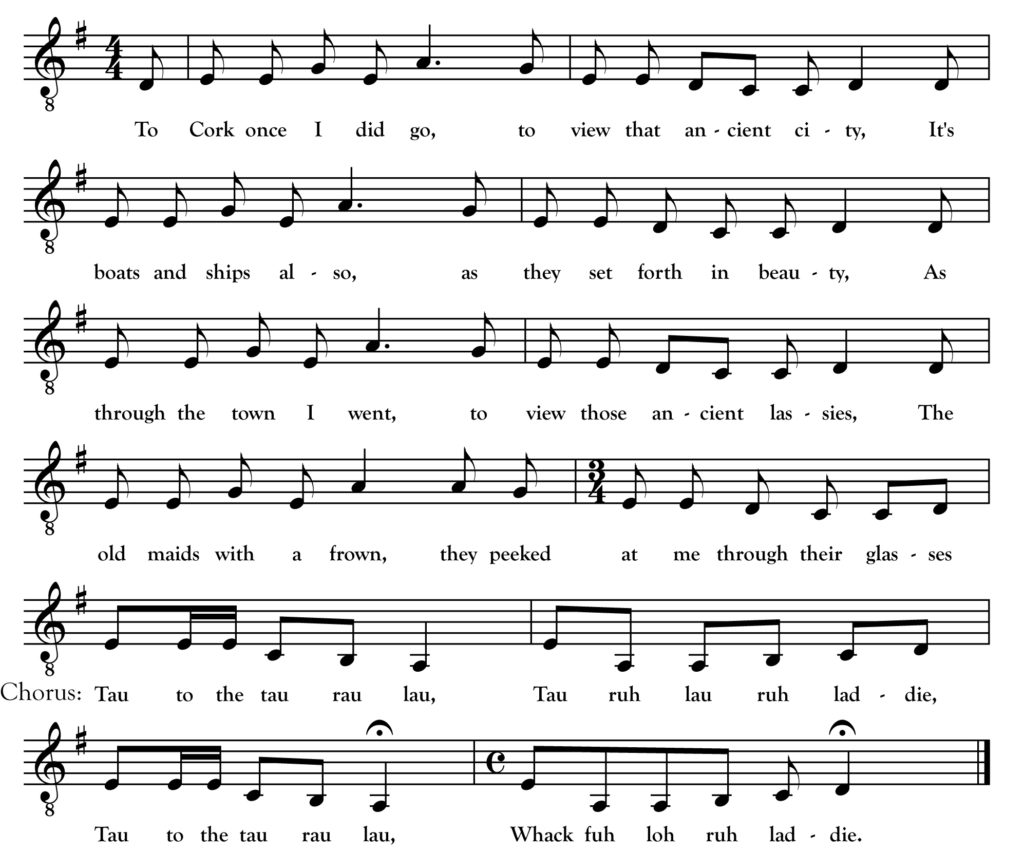Black-Eyed Susan

Source Recording from archive.org (song starts at 19:21)
All in the Downs the fleet lay moored,
The streamers waving in the wind,
When black-eyed Susan came on board,
Saying “Where shall I my true-love find?
Tell me you jovial sailors, tell me true,
Does my sweet Willy, does my sweet Willy sail among your crew?”
Willy who high upon the yard,
Rocked by the billows to and fro,
Soon as her well-known voice he heard,
He sighed and cast his eyes below.
The cord glides slides swiftly through his glowing hands,
And quick as lightning, and quick as lightning on the deck he stands.
“Oh Susan, Susan, lovely dear,
My vows will ever true remain,
Let me kiss off those falling tears,
We only part to meet again,
The noblest captain of all that British fleet,
Might envy Willy, might envy Willy’s lips those kisses sweet.
Believe not what the landsmen say,
They’ll tempt with thee thy constant mind,
They’ll say that sailors, when away,
In every port a mistress find,
Yes, yes, believe them when they tell thee so,
For thou art present, for thou art present whereso’er I go.”
“If to fair India’s coast I sail,
Thine eyes are seen in diamonds bright,
Thy breath is Africa’s spicy gale,
Your skin is ivory so white,
The pleasant breezes whereso’er they blow,
They bring me memories, they bring me memories of my lovely Sue.”
The boatswain gave the dreadful word,
The sails their swelling bosom spread,
No longer could she stay on board,
He turned, she sighed, and hung her head.
Her little boat unwilling rowed to land,
“Adieu”, she cried, “Adieu”, she cried and waved her lily hand.
We have another fascinating song from the repertoire of Charles Finnemore of Bridgewater, Maine this month. Again, Finnemore’s 1943 singing of this song is available online here via the Helen Hartness Flanders Ballad Collection on archive.org. The above is my own transcription of Finnemore’s melody and words. The timing in the transcription is only an approximation so listening to the actual recording online is advised.
Black-Eyed Susan began as a poem by English poet and playwright John Gay (1685-1732) who wrote the famous Beggar’s Opera and was a friend of Jonathan Swift and Alexander Pope. Gay’s poem was put to music by English singer and composer Richard Leveridge and printed (complete with sheet music) in 1750. It became a much-printed and quite popular song in England.
The song has a long history in Ireland as well where Leveridge’s melody was reworked and popular as an instrumental air. Cork-born collector William Forde took down a version played on the uilleann pipes in 1846 by Hugh O’Beirne of Mohill, Co. Leitrim. Perhaps concerned about the melody’s origins, Forde wrote that “O’Beirne swears that this is Irish.” When Scottish-born musicologist Alfred E. Moffat used the air for a song in his 1898 Minstrelsy of Ireland he commented that “a century’s residence in the Emerald Isle has by no means proved a drawback to it.” Indeed, an additional century in the north woods of Maine and New Brunswick may have made it even better! Finnemore’s air, though certainly a variant of the 270-year-old original, is unique and quite compelling.


